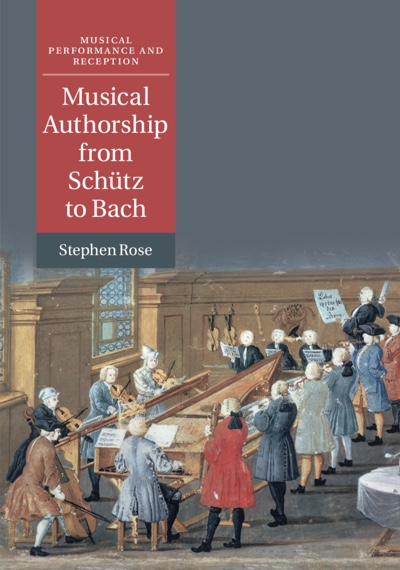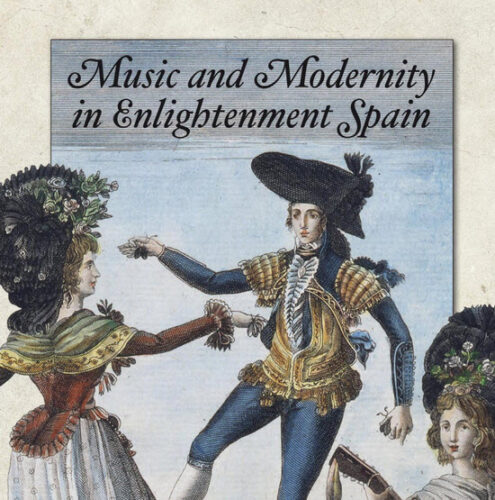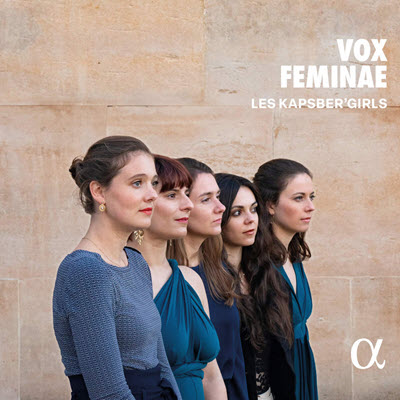by Rachel Carpentier
Published March 16, 2020

Musical Authorship from Schütz to Bach. Stephen Rose. Cambridge University Press. 2019. 243 pages.
In our own day, as in the 17th century, questions of musical authorship concern composers, performers, and publishers alike. What motivates an author? Where is the line between honoring a model and copying it? To whom does a musical work belong? Stephen Rose investigates historical perspectives on these questions from multiple angles in his book Musical Authorship from Schütz to Bach. The bounds of his study — the Lutheran German-speaking lands in the 17th century — suggest, as we read in the title, Schütz and Bach as the bookends, but the author draws on many other composers, performers, theorists, and myriad archival documents from this period. At 215 pages of text, the book is slim and readable to a wide audience. It offers a wealth of new primary texts as evidence (with the original language always provided), as well as refreshing reinterpretations of some of the touchstone documents from the period.
 Rose builds the foundation of his discussion in the first chapter, where he presents three co-existing concepts of musical authorship in 17th-century Germany. The first is compositional talent as a God-given gift to be stewarded for the common good. The second describes compositional ability as an avenue through which a humanist notion of self-glory was sought. The third concept relates compositional skill as an artisanal undertaking, honed through experience, forging a strong link between composer and his work. Rose presents ample evidence for the co-existence of these seemingly contradictory ideas of authorship, exploring the diversity of opinions that co-existed in close proximity and the many ways in which they overlapped.
Rose builds the foundation of his discussion in the first chapter, where he presents three co-existing concepts of musical authorship in 17th-century Germany. The first is compositional talent as a God-given gift to be stewarded for the common good. The second describes compositional ability as an avenue through which a humanist notion of self-glory was sought. The third concept relates compositional skill as an artisanal undertaking, honed through experience, forging a strong link between composer and his work. Rose presents ample evidence for the co-existence of these seemingly contradictory ideas of authorship, exploring the diversity of opinions that co-existed in close proximity and the many ways in which they overlapped.
Each of Rose’s six chapters traces an aspect of authorship during this era. Of chief concern across the chapters is the changing perspectives in ideas of musical authorship over the period discussed. Perhaps the most noteworthy shift in attitude toward authorship was the preference for newly composed church music over older works. In the late 16th century, church musicians were encouraged (even mandated) to sing the music of “old, outstanding composers” (Josquin, Clemens, and Lassus are called by name), establishing something of a fixed musical repertory. (Notably, court composers like Schütz were free from such restrictions.) By the end of the 17th century, however, performing one’s own works had become a defining feature of the role of the Cantor across Lutheran Germany — a musical worldview inherited by Bach in the early 18th century. Composers were now expected to write their own music, and they were seen as “ineffective as a leaky roof” if they could not. Contextualizing Bach’s cantatas into this worldview makes them no less great (and certainly no less worth our efforts as performers and historians) but invites us into a more realistic — dare I say healthy — relationship with those works.
While other scholars have attributed this shift toward a steady diet of newly composed music to a rising “modernity” (citing massive global phenomena such as geographic expansion to the New World and broadening scientific and intellectual horizons, to name a few), Rose counters these rather un-documentable notions with a sharper argument: He associates the interest in newly composed music with early capitalism. The 17th-century Lutheran world’s mounting attraction toward “fashionable” things, and the urge to consume them conspicuously, extended to music. Further, in the relative stability following the Thirty Years War, churches sought to model themselves on courtly behavior, both by imitating their practice of composing new-style music rather than exclusively singing canonized 16th-century fare, and by consuming this new music at a higher rate.

This shifting landscape altered ways of thinking about composers and performers. In some cases, a composer could also be seen as the ideal performer, perhaps guarding his secrets as would a craftsman. In others, he used whatever means available to clarify his intentions to potential performers, as with Schütz’s instructions in the preface to his Psalmen Davids of 1619. Whatever the case, Rose challenges contemporary critical views from performance studies that de-emphasize the role of the composer by showing that, especially toward the end of the 17th century, performers and composers were understood as occupying two separate spheres, blurring the line of authorial primacy.
Rose offers a fresh perspective on enduring questions asked by performers and historians alike. Far from offering a tidy compartmentalization of these issues present in 17th-century Lutheran Germany, Rose exposes manifold ways of understanding musical authorship, often overlapping and sometimes conflicting. Ultimately, authorship was a collaborative enterprise between composer and performers, not to mention scribes and printers. The “author” was not made solely at the moment of composition; rather, that designation followed a composer through to publication, performance, reception, and even our continued engagement today. Although Lutheran lands clearly define the scope of this book, the questions Rose discusses would benefit from a comparative treatment alongside confessional Catholic areas in the same period — perhaps a theme another scholar can take up as a response to Rose’s insightful and intriguing new study.
Rachel Carpentier is a doctoral student in musicology at Boston University, teaches courses in music history at Boston College, and performs on historical flutes.




